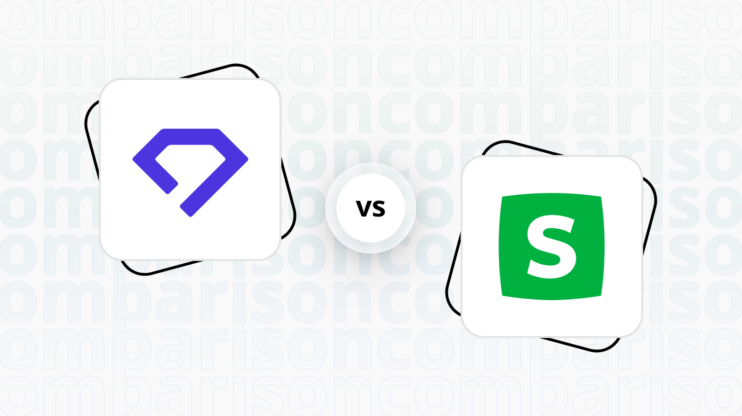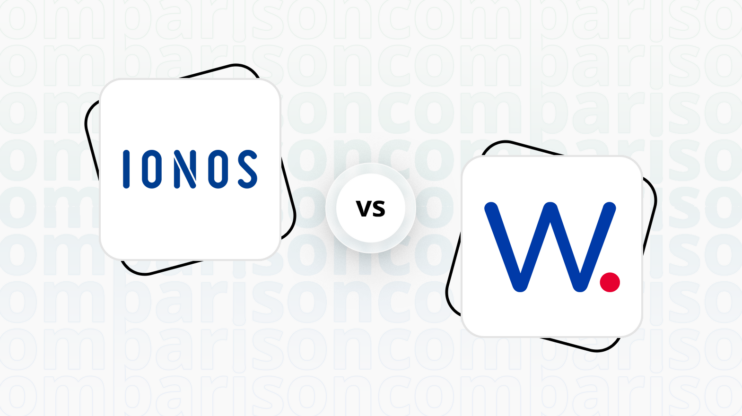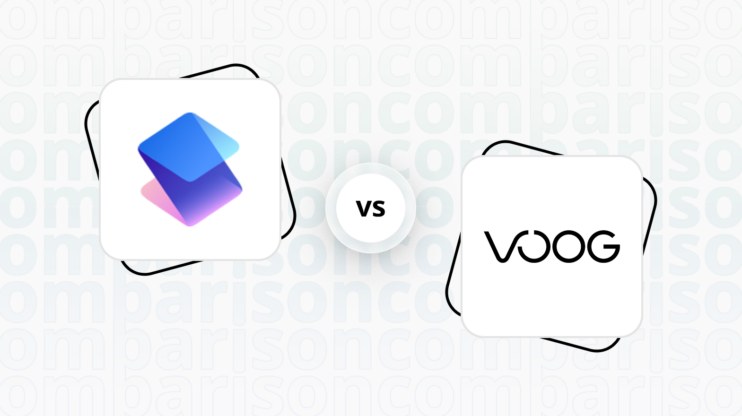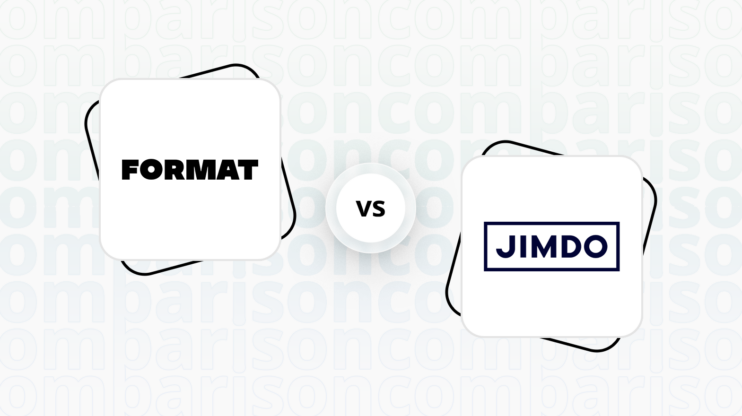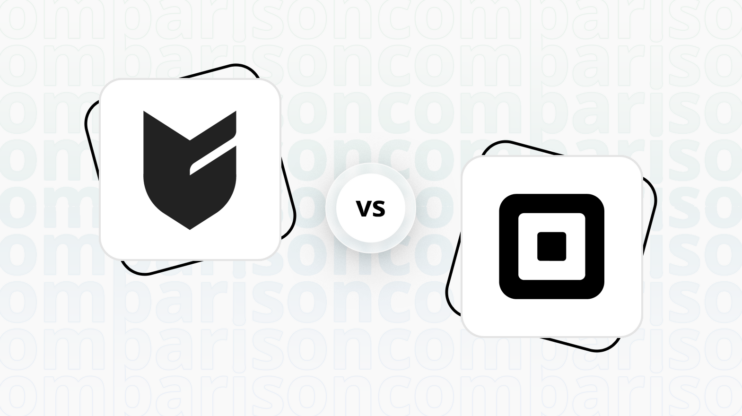Final verdict
Google Sites vs Sellfy both offer unique advantages, but they cater to different needs.
-
Google Sites (Overall Grade: 5.6/10)
is ideal for users seeking a simple, collaborative website builder with seamless integration with other Google services. It excels in ease of use, customer support, and security, making it a great choice for team projects, personal portfolios, and small business websites. However, it lacks built-in ecommerce features and advanced customization options, which may limit its appeal for users looking to create more complex or ecommerce-focused websites. -
Sellfy (Overall Grade: 6.0/10)
is tailored for creators looking to sell a wide array of products, including digital, physical, subscription-based, and print-on-demand items. It offers a user-friendly interface, comprehensive ecommerce features, and strong marketing tools, making it a versatile platform for online businesses. While it may not have the same level of integration and collaborative features as Google Sites, Sellfy’s focus on simplifying the ecommerce process and providing robust tools for managing and scaling online businesses makes it a strong contender in the ecommerce space.

|

|
|
|---|---|---|
|
Design functionalities & templates |
4.9 |
5.2 |
|
Ease of use |
8.3 |
7.8 |
|
Ecommerce |
1.8 |
6.8 |
|
Website Editors |
7.0 |
6.8 |
|
Product testing options |
6.9 |
7.3 |
|
Price |
8.1 |
7.9 |
|
Hosting quality |
8.2 |
7.3 |
|
Website speed optimization |
3.3 |
5.4 |
|
Plugins and integrations |
6.4 |
6.7 |
|
Marketing features |
2.6 |
7.1 |
|
Customer support |
7.2 |
5.8 |
|
Security |
9.3 |
7.2 |
|
User Management |
7.8 |
2.0 |
Best for ecommerce
 1.8
1.8
 6.8
6.8
Verdict
: Google Sites is not designed for ecommerce, making Sellfy the clear winner for online selling needs.
-
Google Sites
: Primarily a tool for creating simple websites, Google Sites lacks built-in ecommerce features. Users can integrate third-party tools for basic ecommerce functionalities, but it falls short in providing a comprehensive ecommerce solution. When comparing Google Sites vs Sellfy, Google Sites is not suitable for serious ecommerce ventures. -
Sellfy
: Tailored for creators looking to sell a variety of products, Sellfy offers a user-friendly platform with built-in marketing tools, secure payment processing, and product protection features. It supports digital, physical, subscription-based, and print-on-demand items, making it a versatile choice for online sellers.
Best for informational & business websites
 7.2
7.2
 5.7
5.7
Verdict
: Google Sites is better suited for informational and business websites due to its user-friendly interface, robust integration with Google services, and comprehensive support system. Sellfy, while strong in ecommerce, lacks the versatility and ease of use that Google Sites offers for non-ecommerce purposes.
-
Google Sites
: Google Sites scores 7.2 for informational and business websites. It is designed for ease of use with a drag-and-drop interface, making it accessible for users without coding knowledge. The platform integrates seamlessly with other Google services, enhancing functionality and collaboration. It is ideal for team projects, personal portfolios, and small business websites. -
Sellfy
: Sellfy scores 5.7 for informational and business websites. It is primarily an ecommerce platform tailored for creators selling various products. While it offers a simple and user-friendly interface, its focus on ecommerce limits its effectiveness for purely informational websites. Sellfy is better suited for users looking to integrate ecommerce functionalities into their informational sites.
Detailed comparison
Design functionalities & templates
Design FunctionalitiesRepresents how well each platform allows for creative design and customization of websites.Score Components:
- Template Variety (30%): Range and quality of design templates.
- Customization (30%): Flexibility and options for design alterations.
- User Interface (20%): Ease and intuitiveness of the design process.
- Responsiveness (10%): Adaptability to different devices and screen sizes.
- Innovation (10%): Unique design features and tools.
 4.9
4.9
 5.2
5.2
🏆
Winner: Sellfy.
Although both platforms offer a user-friendly interface and mobile responsive design, Sellfy edges out Google Sites with a slightly higher score and a more focused approach to ecommerce.
Google Sites offers a limited number of templates suitable for various purposes, from personal blogs to business websites. These templates are designed for user engagement, simplicity, and functionality, allowing for customization to meet specific needs. However, compared to other website builders, Google Sites might offer less variety in templates and design customization options.
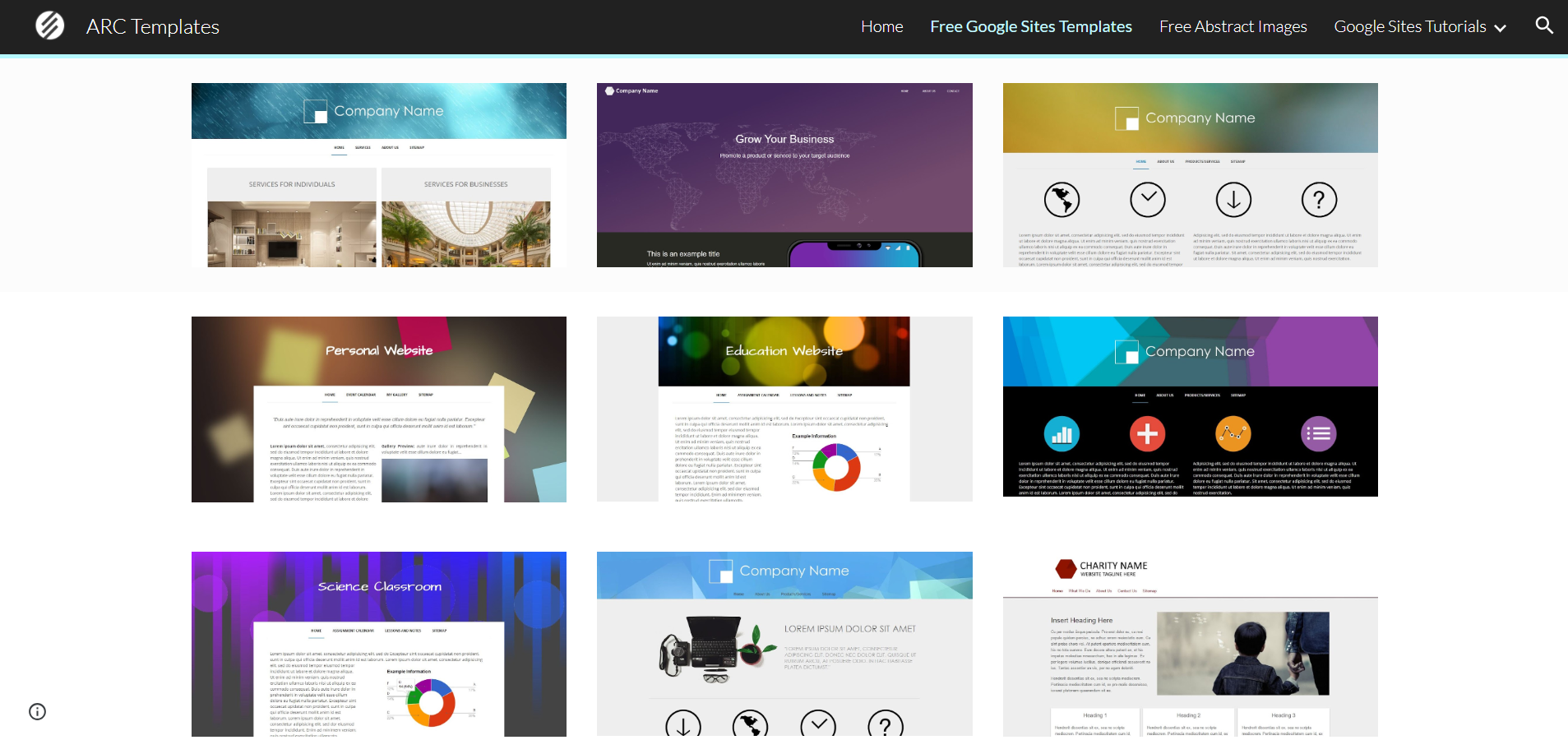

On the other hand, Sellfy provides a collection of design templates through its theme store, located in the Store Customizer. Users have the option to preview these themes before applying them to their websites. As of the latest information, Sellfy offers five main theme options: Lumiére, Noir, Savant, Idée, and Mode. These themes cater to various aesthetic preferences and can be published to go live on a user’s website after selection and customization.
Get a head start on website creation with AI
Create a custom website tailored to your business needs 10X faster with 10Web AI Website Builder!
Ease of use
Ease of useReflects the platform’s overall user-friendliness.Score
Components:
- Learning curve (40%): Quickness and ease of getting started.
- Interface design (30%): Simplicity and intuitiveness of layout.
- User guidance (20%): Quality of tutorials and support.
- Flexibility (10%): Adaptability to various user skills.
 8.3
8.3
 7.8
7.8
🏆 Winner: Google Sites
. Scoring 8.3, Google Sites offers a user-friendly interface that allows individuals with no coding experience to create and publish websites easily. The drag-and-drop functionality simplifies the design process, making it accessible for users to add content, images, and customize layouts without technical difficulties. Sellfy, with a score of 7.8, offers an intuitive user interface and a straightforward website builder, but it lacks a large community of users. If ease of use is a priority, Google Sites is the clear winner in this category.
Learning Resources
🏆 Winner: Google Sites
. Google Sites offers a wide array of learning resources, spanning from practical guides for educators to create student portfolios and classroom websites to comprehensive digital skill development programs for the wider public. On the other hand, Sellfy offers resources for users to sell a variety of products, but it has limitations in customization, analytics depth, and support for physical products.
For ecommerce
EcommerceMeasures the platform’s effectiveness in supporting online business activities.Score Components:
- Ecommerce themes and templates (20%): Variety and design of templates.
- Product management (25%): Ease of managing and organizing products.
- Payment options (25%): Variety and convenience of payment methods.
- Ecommerce features (20%): Features for managing an ecommerce store.
- Integration (10%): Compatibility with external e-commerce tools and services.
 1.8
1.8
 6.8
6.8
When it comes to ecommerce, Sellfy is a clear winner over Google Sites. Sellfy is designed specifically for ecommerce, offering a user-friendly platform for selling a wide array of products, including digital, physical, subscription-based, and print-on-demand items. It features built-in marketing tools, content security measures, and supports payment processing via Stripe and PayPal without additional transaction fees.

|

|
|
|---|---|---|
|
Ecommerce themes and templates |
0.0 |
7.0 |
|
Product page customization |
0.0 |
6.5 |
|
Payment processing and commissions |
1.0 |
8.0 |
|
POS capabilities |
0.0 |
4.0 |
|
Payment gateways |
2.0 |
6.0 |
|
Product numbers |
0.0 |
7.5 |
|
Additional ecommerce features |
0.5 |
6.5 |
Sellfy ecommerce features:
- Product Listings
- Payment Gateways integration
- Product categories
Google Sites ecommerce features:
- Google Sites itself does not have built-in eCommerce features.
Ecommerce themes & templates
Sellfy offers templates designed specifically for online stores, while Google Sites does not have any ecommerce templates.
Product page customization
Sellfy supports a diverse range of products including digital goods like music, videos, ebooks, and software, as well as physical products and print-on-demand merchandise such as t-shirts and mugs. The platform enables the sale of subscriptions, offering a means for recurring revenue. Sellfy provides tools for product protection and piracy prevention, ensuring secure file hosting and delivery.
On the other hand, Google Sites lacks any product page customization features, as the products can be listed with embedding third-party platforms, all the customization can be done within the mentioned platforms.
Payment processing
Sellfy supports two primary payment gateways, Stripe and PayPal, allowing for various payment options including credit/debit cards and localized payment methods in Europe. The platform does not charge transaction fees beyond its subscription cost, though payment processors’ standard fees apply.
You can integrate payment gateways into Google Sites using external tools or links, not through native features. This can be done by embedding HTML code for payment buttons from services like PayPal, Square, or Stripe, or by linking to an external checkout page. Third-party eCommerce widgets also offer a way to add payment functionalities. However, Google Sites doesn’t offer the comprehensive eCommerce capabilities that dedicated platforms provide.
Website Editors
Website EditorsEvaluates the platforms’ website building and editing capabilities.Score Components:
- Customization tools (40%): Range and power of editing features.
- Editor usability (30%): User experience within the editor.
- Design flexibility (20%): Freedom in layout and design changes.
- Update and maintenance ease (10%): Simplicity of updating and maintaining the site.
 7.0
7.0
 6.8
6.8
🏆
Winner: Google Sites
. Google Sites, with a score of 7.0, offers a user-friendly website builder editor that allows users to create and design websites without needing coding knowledge. With its drag-and-drop interface, users can easily add, customize, and arrange elements such as text, images, and videos on their web pages. It also provides a variety of templates and design options to help users get started quickly and ensure their site looks professional. Additionally, Google Sites integrates seamlessly with other Google services, enabling the incorporation of Google Docs, Sheets, Slides, and Maps directly into the website.
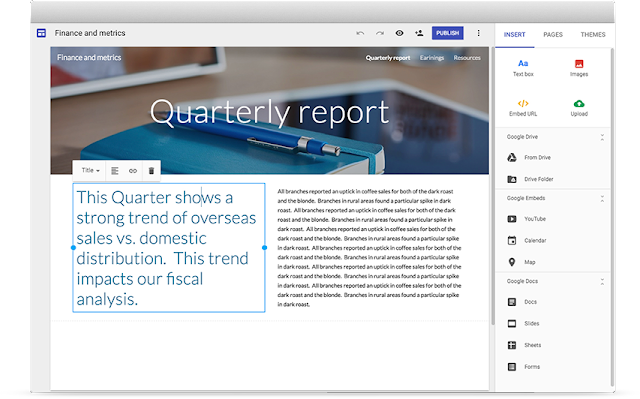
Sellfy’s editor, scoring 6.8, offers a straightforward and user-friendly platform for creating online stores, focusing on simplicity over advanced customization. It supports the sale of digital, physical, subscription-based, and print-on-demand products, alongside integrated marketing tools for promotion and sales optimization. Payment processing is secure and direct, utilizing popular gateways like Stripe and PayPal with no transaction fees. Despite some limitations in design customization and app integrations, Sellfy aims to provide a comprehensive e-commerce solution for entrepreneurs and creators.
Mobile editor/app
 0
0
 7.5
7.5
🏆
Winner: Sellfy
. Google Sites does not offer a mobile editor app, which means users cannot edit their websites on mobile devices. This is a significant limitation, especially for users who prefer to work on their websites while on the go.
On the other hand, Sellfy offers a mobile app that allows users to manage their online stores on the go. The app offers functionalities such as viewing store performance metrics, managing and tracking orders, and receiving customized notifications. Users can also access summary reports of their store’s performance on a daily, weekly, or monthly basis.
However, it’s important to note that the Sellfy app does not allow users to change the layout or design of the website itself. Despite this limitation, Sellfy still offers more mobile editing capabilities than Google Sites, making it the winner in this category.
Product testing options
Product Testing OptionsAssesses the options for trying out platform features before commitment.Score Components:
- Trial quality (40%): Extent and usefulness of the trial or free version.
- Feature accessibility (30%): How many features are available to test.
- Trial duration (20%): Length of the trial period.
- Ease of transition (10%): Smoothness of moving from trial to paid plans.
 6.9
6.9
 7.3
7.3
Overall Result
:
Sellfy Wins
. Sellfy scores slightly higher than Google Sites with a score of 7.3 compared to Google Sites’ 6.9. Both platforms offer a 14-day free trial, but Sellfy stands out by offering a 30-day money-back guarantee and the ability to test premium features during the free trial. Google Sites, on the other hand, offers a free version and allows testing of some premium features within the trial period.

|

|
|
|---|---|---|
|
Free Plan |
Yes | No |
|
Trial Duration |
14 days | 14 days |
|
Testing Premium Features |
Some features during free trial |
All features during free trial |
|
Money Back Guarantee |
No |
30 days |
Price
PriceLooks at the cost-effectiveness and value for money of each platform.Score Components:
- Plan value (40%): What each pricing tier offers.
- Transparency and clarity (30%): Clearness of pricing structures.
- Flexibility of plans (20%): Range of options to suit different budgets.
- Hidden costs (10%): Additional expenses not included in the plan.
 8.1
8.1
 7.9
7.9
Google Sites and Sellfy both offer competitive pricing plans, but Google Sites has a slight edge with a higher price score and an Enterprise plan for large organizations.

|

|
|
|---|---|---|
|
$0-$10 |
Business Starter ($7.20/month): This plan includes basic features suitable for individuals or small businesses, offering professional email through Gmail, 30GB of storage per user, and video meetings for up to 100 participants. It allows to manage 1 website and there is no limitation on number of pages. Value for price: 6.0 |
No offering at this amount. |
|
$10-$20 |
Business Standard ($14.40/month): Suitable for growing businesses, this plan provides 2 TB of storage per user, video meeting capacity for up to 150 participants with recording features, and access to smart booking pages and shared drives. It allows to manage 1 website and there is no limitation on number of pages. Value for price: 7.5 |
No offering at this amount. |
|
$20-$30 |
Business Plus ($21.60/month): Designed for larger businesses needing more robust capabilities, offering 5 TB of storage per user, advanced security options, and video meetings for up to 500 participants. It allows to manage 1 website and there is no limitation on number of pages. Value for price: 8.5 |
Starter ($29/month): Ideal for growing businesses with sales up to $10k/year. Offers unlimited products, digital and subscription products, domain connection, and 2,000 email credits. Annual savings available. Value for price: 7.5 |
|
$70-$80 |
No offering at this amount. |
Business ($79/month): Targets businesses with up to $50k in yearly sales, offering everything in the Starter plan plus 10,000 email credits, product and store design migration, product upselling, cart abandonment tools, and Sellfy branding removal. Value for price: 8.0 |
|
$100+ |
No offering at this amount. |
Premium ($159/month): For businesses with up to $200k/year in sales. Includes everything in the Business plan plus 50,000 email credits, product migration, and priority support. Annual savings are also offered. Value for Price: 8.5 |
location. As a result in rare cases the prices displayed here can differ from the ones you see on their
websites.
Hosting quality
Hosting
qualityExamines the reliability and performance of the hosting solutions.Score Components:
- Uptime (40%): Consistency and reliability of website availability.
- Speed (30%): Loading times and performance.
- Bandwidth and storage (20%): Sufficiency of resources provided.
- Data centers (10%): Quality and distribution of hosting infrastructure.
 8.2
8.2
 7.3
7.3
🏆
Winner: Google Sites
Google Sites offers cloud-based managed hosting with a 99.9% uptime guarantee and operates 21 data centers globally. Sellfy also offers hosting with a higher uptime of 99.99%, but does not provide an uptime guarantee or disclose the type and locations of its data centers. Google Sites’ transparency and reliability give it the edge in this category.

|

|
|
|---|---|---|
|
Do they offer hosting? |
Yes, basic storage with 100MB free per site, can be increased by upgrading to Google Workspace |
Yes |
|
Data Centers: |
Google operates a total of 21 data centers across the globe: 2 in Asia, 5 in Europe, 13 in US and 1 in South America |
Sellfy does not disclose the locations of its data centers |
|
Type of hosting: |
Cloud based managed hosting |
Sellfy does not disclose the hosting type |
|
Uptime: |
99.9% |
99.99% |
|
Uptime Guarantee: |
Yes, 99.9% |
No |
Website Speed Optimization
Website Speed OptimizationEvaluates optimization of website loading timesScore Components:
- PageSpeed Score (30%): Google’s score indicating performance optimization.
- Loading Time (30%): The average time until a website is fully interactive.
- Mobile Optimization (15%): Optimization effectiveness for mobile devices.
- Resource Optimization (15%): Optimizing images, scripts, and other heavy resources.
- CDN Usage (10%): Use of CDN to enhance speed across geolocations.
 3.3
3.3
 5.4
5.4
🏆 Winner: Sellfy
Both Google Sites and Sellfy have strategies in place for website speed optimization, but Sellfy has a higher website speed optimization score.

|

|
|
|---|---|---|
|
Focus |
Automated Optimization, CDN, Mobile Optimization, Browser Caching, Code Minification, Use of AMP |
Code Minification, Caching, Image Optimization |
|
Performance Tools |
Google Lighthouse, PageSpeed Insights |
Google PageSpeed Insights Integration |
|
Key Strategies |
Automated Optimization, CDN, Mobile Optimization, Browser Caching, Code Minification, Use of AMP |
Code Minification, Caching, Image Optimization |
|
Load Times |
Not disclosed by Google |
Varies depending on optimization and website complexity |
|
Page Speed Scores Range |
Not disclosed by Google |
Varies depending on optimization and website complexity |
|
Core Web Vitals Improvement |
Emphasis on LCP, FID, CLS improvements |
No information provided by Sellfy |
Google Sites, a structured web page-creation tool, focuses on automated optimization, CDN, mobile optimization, browser caching, code minification, and the use of AMP for website speed optimization. However, Google does not disclose statistics about website Page Speed scores or load times. Google Sites places emphasis on improving the Largest Contentful Paint (LCP), First Input Delay (FID), and Cumulative Layout Shift (CLS) for Core Web Vitals.
On the other hand, Sellfy, an all-in-one eCommerce platform, focuses on code minification, caching, and image optimization for website speed optimization. The load times and PageSpeed scores vary depending on optimization and website complexity. However, Sellfy does not provide any information on their Core Web Vitals improvements. Despite the lack of information on Core Web Vitals improvements, Sellfy has a higher website speed optimization score compared to Google Sites.
Get a head start on website creation with AI
Create a custom website tailored to your business needs 10X faster with 10Web AI Website Builder!
Plugins and integrations
Plugins and integrationsMeasures the range and effectiveness of additional plugins and integrations.Score Components:
- Variety of options (40%): Range of available add-ons.
- Integration smoothness (30%): Ease of integrating plugins into the site.
- Quality of plugins (20%): Functionality and reliability of the options.
- Custom integration capabilities (10%): Support for custom or third-party integrations.
 6.4
6.4
 6.7
6.7
🏆 Winner: Sellfy.
Sellfy scores 6.7, slightly edging out Google Sites with a score of 6.4. Sellfy offers a variety of integrations, including Google Analytics, Facebook Live Chat, and Zapier, which enhance ecommerce functionality and automate workflows. Google Sites, on the other hand, offers a wide array of plugins and extensions to enhance website functionality, catering to various needs such as social media integration, e-commerce, chats, forms, video, audio, and more. However, Sellfy’s focus on ecommerce and automation gives it a slight advantage in this category.

Marketing Features
Design FunctionalitiesRepresents how well each platform allows for creative design and customization of websites.Score Components:
- Template Variety (30%): Range and quality of design templates.
- Customization (30%): Flexibility and options for design alterations.
- User Interface (20%): Ease and intuitiveness of the design process.
- Responsiveness (10%): Adaptability to different devices and screen sizes.
- Innovation (10%): Unique design features and tools.
 2.6
2.6
 7.1
7.1
🏆
Overall Winner: Sellfy
. Sellfy stands out for its comprehensive marketing tools, especially in email marketing, SEO, and ad campaign management. Google Sites, while offering basic SEO and analytics features, lacks in email marketing and ad campaign management.

|

|
|
|---|---|---|
|
SEO Tools |
Basic SEO settings |
Comprehensive SEO settings |
|
Email Marketing |
No |
Yes |
|
Blogging |
No |
No |
|
Social Media Integration |
Basic integration with social media links and widgets |
Advanced integration for selling directly on platforms |
|
Analytics and Reporting |
Google Analytics integration |
Comprehensive analytics and reporting |
|
Ads and Promotions |
No |
Yes |
Customer Support
Customer supportEvaluates the quality and availability of support options.Score Components:
- Response time (40%): Speed of support responses.
- Support quality (30%): Effectiveness and helpfulness of the support.
- Availability (20%): Range of support channels (phone, chat, email).
- Resource richness (10%): Quality of self-help and educational materials.
 7.2
7.2
 5.8
5.8
🏆 Winner: Google Sites
. In the comparison of Google Sites vs Sellfy, Google Sites takes the lead with a customer support score of 7.2. Google Sites offers a range of support options, including a Help Center, community forums, and 24/7 support for critical issues for Google Workspace customers. This makes it a reliable choice for users needing consistent and accessible support.
Sellfy, on the other hand, has a customer support score of 5.8. While Sellfy provides 24/7 support, it lacks phone and live chat options, limiting users to email and self-service resources. This can be a drawback for users who prefer more immediate and interactive support channels. Additionally, Sellfy does not offer specialized support for enterprise-level customers, which may be a consideration for larger businesses.
Security
SecurityLooks at the platforms’ security measures and data protection.Score Components:
- Data protection (40%): Safeguards for user and customer data.
- SSL and encryption (30%): Implementation of secure connections.
- Compliance (20%): Adherence to industry security standards.
- Regular updates (10%): Frequency of security updates and patches.
 9.3
9.3
 7.2
7.2
🏆
Winner: Google Sites
. Google Sites, part of the Google Workspace, offers robust security measures including data encryption, two-factor authentication, and automatic malware scanning. It adheres to international data protection regulations and benefits from Google’s regular security updates. Google’s infrastructure also provides DDoS protection and data redundancy, ensuring a secure environment for website creators and visitors.
On the other hand, Sellfy focuses on the security of digital products and transactions. It uses secure payment processors and provides unique download links for each purchase, limiting download attempts and using tools like PDF stamping to deter content sharing. While these measures are effective, they are more specific to e-commerce and digital product sales, making Google Sites a more comprehensive choice for overall website security.
AI Capabilities
AI capabilitiesMeasures the effectiveness of AI-driven features and tools.Score Components:
- Automation efficiency (40%): Impact of AI on streamlining processes.
- Personalization (30%): AI-driven customization for users or customers.
- AI-Assisted design (20%): Role of AI in website design and functionality.
- Data analysis (10%): Use of AI in interpreting user data and analytics.
 0
0
 0
0

|

|
|
|---|---|---|
|
Personalized Design |
|
|
|
SEO Optimization |
|
|
|
Customer Behavior Analysis |
|
|
|
Sales Predictions |
|
|
|
Inventory Management |
|
|
|
Content Generation |
|
|
🏆 Winner: None
. Neither Google Sites nor Sellfy offer AI capabilities. Both platforms focus on providing a user-friendly interface for creating and managing websites or online stores, but they do not utilize AI to enhance the user experience or optimize the website’s performance.
User Management
User ManagementAssesses the platforms’ capabilities in managing user roles, permissions, and accessibility.Score Components:
- Role Customization (40%): Flexibility in creating and defining user roles and
permissions. - Ease of Management (30%): User interface and tools for managing users.
- Access Control (20%): Effectiveness of access control measures for different user
levels. - Scalability (10%): Ability to manage a growing number of users efficiently.
 7.8
7.8
 2.0
2.0
🏆 Winner: Google Sites
. Google Sites and Sellfy have different approaches to user management.
- Google Sites allows multiple users to collaborate with different roles, including Owners, who have full control, and Editors, who can modify content but not site settings. There’s no strict limit on the number of users who can edit a site, allowing flexibility in management and development. Viewers can only see the site, with no editing permissions. This structure supports collaborative website building with varied levels of access and control for different users.
- Sellfy does not support adding multiple users or staff to a single account. This limits the platform’s ability to support collaborative work.
Unfortunately, there are no user roles tables available for both platforms.
Additional Features

|

|
|
|---|---|---|
|
SSL Certificate |
|
|
|
Custom Domain |
|
|
|
Free Custom Domain Included |
|
|
|
International Domains |
|
|
|
Mobile Responsive |
|
|
|
Page Speed |
|
|
|
Website Builder Mobile App |
|
|
|
Convert a Website To An App |
|
|
|
Website Analytics |
|
|
|
Multilingual Sites |
|
|
|
Multiple Users |
|
|
User Feedback
Users consistently praise Google Workspace, particularly Google Sites, for its seamless integration, ease of use, and collaborative features, making it a go-to solution for various professional and educational needs. The platform’s simplicity and user-friendly interface are lauded, enabling effortless website creation and sharing of information within organizations. While some users desire more customization options and additional features, overall, Google Workspace remains highly valued for its versatility and streamlined workflow facilitation.
The user feedback on Sellfy highlights its strengths in providing an efficient, compact online store setup that caters to specific needs with affordable pricing, including a 14-day trial period to familiarize users with the product. Many appreciate its user-friendly interface, internal marketing tools, and customization options, which enable sellers to tailor their storefronts to their brand, along with integrations for payment processing like PayPal and Stripe. However, criticisms include issues with mobile site speed, a desire for clearer insights, limitations on customization, and some customer service inefficiencies.
The making of this blog
We followed a clear, step-by-step process to write and research this article.
FAQ
Which platform is better for creating an online store, Google Sites or Sellfy?
Can I use Google Sites for a business website?
How do Google Sites and Sellfy compare in terms of ease of use?
What are the main differences in pricing between Google Sites and Sellfy?
Which platform offers better customer support, Google Sites or Sellfy?
Are there any ecommerce features available on Google Sites?
Can I sell digital products on Sellfy?
Which platform is better for website speed optimization?
How do Google Sites and Sellfy handle website security?
Can I manage multiple users on both platforms?











